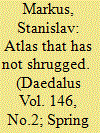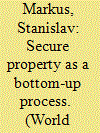| Srl | Item |
| 1 |
ID:
152140


|
|
|
|
|
| Summary/Abstract |
There is demand among Russia's oligarchs for systemic change, but not for the rule of law proper. Instead, it is the defacto accountability of political elites and improved relations with the West that the Russian oligarchs want from the Kremlin. However, the oligarchs currently lack the capacity to effect change. Their insufficient leverage vis-à-vis Putin is rooted in their competition for rents, which prevents them from confronting the Kremlin as a united force. In addition to analyzing the lack of systemic pressure for change from the oligarchs, this essay considers the prospects of individual oligarchs who have nevertheless pushed openly for liberalization or tried to effect incremental change. It also draws on comparisons with other countries to chart the political behavior of Russia's business elites in the future.
|
|
|
|
|
|
|
|
|
|
|
|
|
|
|
|
| 2 |
ID:
111844


|
|
|
|
|
| Publication |
2012.
|
| Summary/Abstract |
How do property rights become secure? How does rule of law take hold in an economy? The author uses an original survey of 516 firms in Russia and Ukraine, as well as interview-based case studies, to reexamine these fundamental issues of political economy. Most states in the developing world lack the requisite time horizons and institutional capacity to make the credible commitments emphasized in the literature. In this context, the author argues that firms can enforce their property rights without resort to mafias by forming alliances with stakeholders such as foreign actors, community residents, and labor. These stakeholders can impose costs on the potential aggressors through diverse political strategies, allowing firms to defend their property rights not only from private predators but also from the state. The article evaluates this "bottom-up" theory of secure property rights against existing state-based theorizing.
|
|
|
|
|
|
|
|
|
|
|
|
|
|
|
|